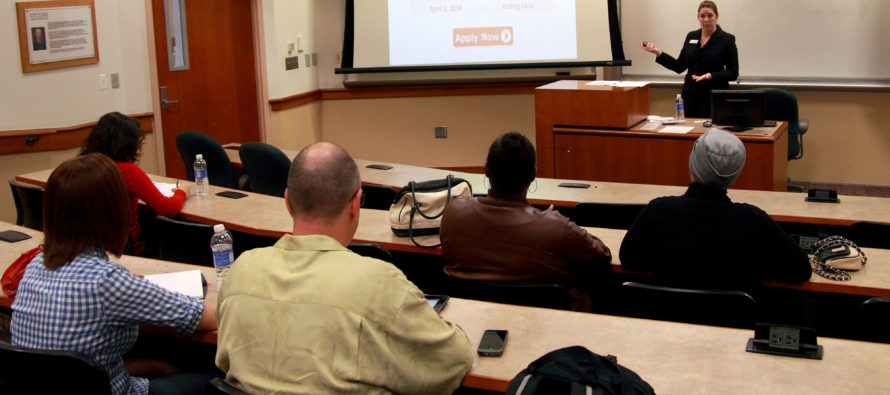No, UCLA, Gender Equality in B-School Faculty Isn’t ‘Mathematically Impossible’

Related Articles
Closing the gender pay gap at U.S. business schools is mathematically impossible, according to a finance professor at UCLAs Anderson School of Management.
Bhagwan Chowdhry, writing in a recent Huffington Post article, asserts that data showing women are paid less than men does not prove business schools discriminate. Hiring more women, he argues, wont fix the problem either, only lower the overall quality of the professoriate. His solution is one weve heard from other faculty at Anderson and elsewhere in business education: We need more qualified women in the pipeline for faculty positions.
Chowdhrys article is noteworthy because of where he teaches. Anderson has been under fire for its poor gender record, although Chowdhry, and Anderson, which posted the piece on its website, apparently dont view this criticism as a matter of serious concern. Anderson positions the piece as an authoritative pronouncement on the futility of trying to close the gender pay gap in the general workforce. The article is simply a poorly framed defense of a situation that some, including members of Andersons own faculty, find unacceptable.
Chowdhrys argument is built on assumptions that are at odds with data from the Association to Advance Collegiate Schools of Business (AACSB) showing that female business school faculty are not only paid less at every level, but are leaving the field at higher rates than male counterparts and are less likely to advance. This pattern is evident in all business disciplines, but is especially pronounced in finance, where the numbers of women are smaller, the attrition rate steeper, and the pay gap greater. (Finance is where the gender imbalance is greatest, at a 10 percent female/90 percent male ratio.)
The result is that over time, women remain in untenured posts while men move into full professorships where they have influence over everyone else. The impact of this phenomenon on womens ability to advance can be dramatic. At Anderson, for instance, full professors are mostly male and concentrated in finance, a group large enough to sway the outcome of tenure and promotion decisions proposed by other departments at the school.
Dr. Chowdhrys ideological smokescreen ignores this power imbalance, as well as the problem of female faculty retention, which vastly overshadows recruitment as a contributor to gender inequality. Chowdhry wants to pass blame to a vague talent pool that is unaccountably providing too few women, especially in finance. Anderson Dean Judy Olian and Ivo Welch, another finance professor there, also point to this as the source of skewed gender representation. The cure then is to fix the pipeline, writes Chowdhry. The gender balance in pay will follow.
Business schools themselves are the source of this shallow candidate pool. Institutions where we might likely look for newly minted finance faculty are also the schools where the female faculty are least well-represented. The University of Chicago Booth School of Business, which is very strong in finance and economics, has only 16 percent female faculty, less than Andersons 19 percent. Columbia Business School, like Anderson, has more finance faculty than any other discipline, but women represent 14 percent of the total, one of the lowest among U.S. business schools.
Chowdhry doesnt understand why the pipeline argument is circular. The skewed dynamics in business school facultiesdemeaning behaviors, dismissive remarks, unfair assessments, and lower payare pumped like toxins back into doctoral programs for professors and students alike to breathe. As long as that connection is ignored or denied, the candidate pool will be badly unbalanced.
Potential female recruits will also continue to be deterred by the poor prospects for advancement. The finance professor glibly declares that there are two types of recruits, superstars and everybody else. His assumption deftly finesses the matter of how superstardom is conferred and by whom. Chowdhrys silence on this issue is especially worrisome because both the 2006 and 2014 reports on Andersons gender problem pointed out that female faculty members were subjected to unfair scrutiny and criticism, as well as being held to higher standards than men. Career outcomes depend on individual capability and ambition, but they also hinge on evaluations by othersevaluations that, in Andersons case, have been reversed by university leadership as unfair.
Chowdhry falls back on a classic market forces argument: If women were actually paid less than their male counterparts for the same work, he claims, companies would try to maximize profits by adding more women they can pay less, thus saving on labor costs. He fails to recognize there is a very good reason responsible organizations might not do as he suggests: Its sex discrimination and its illegal.
Chowdhry, of course, has the right to express his opinion. And we can be grateful for his contribution: He unwittingly exposes why it has been so hard for the female faculty at Andersonand other business schoolsto thrive.
No Comments
Only <a href="http://foreignmba.com/mba/wp-login.php?redirect_to=http%3A%2F%2Fforeignmba.com%2Fno-ucla-gender-equality-in-b-school-faculty-isnt-mathematically-impossible%2F"> registered </a> users can comment.


Let me tell You a sad story ! There are no comments yet, but You can be first one to comment this article.
Write a comment